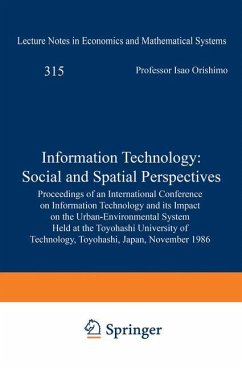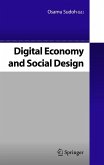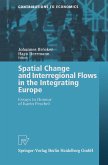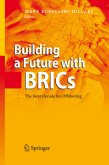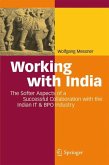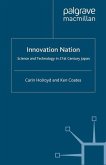Information Technology: Social and Spatial Perspectives
Proceedings of an International Conference on Information Technology and its Impact on the Urban-Environmental System Held at the Toyohashi University of Technology, Toyohashi, Japan, November 1986
Herausgegeben:Orishimo, Isao; Hewings, Geoffrey J.D.; Nijkamp, Peter
Information Technology: Social and Spatial Perspectives
Proceedings of an International Conference on Information Technology and its Impact on the Urban-Environmental System Held at the Toyohashi University of Technology, Toyohashi, Japan, November 1986
Herausgegeben:Orishimo, Isao; Hewings, Geoffrey J.D.; Nijkamp, Peter
- Broschiertes Buch
- Merkliste
- Auf die Merkliste
- Bewerten Bewerten
- Teilen
- Produkt teilen
- Produkterinnerung
- Produkterinnerung
The book contains perspectives on the way new informationtechnology might reorient the spatial organization ofactivity. The perspectives range from conceptual, high-lighting the role of research and development to casestudies from Japan. Considerable debate is focused on therole of distance and the way in which new informationtechnology might re-shape interaction and, eventually, theform and function of urban areas.
Andere Kunden interessierten sich auch für
![Digital Economy and Social Design Digital Economy and Social Design]() Osamu Sudoh (ed.)Digital Economy and Social Design125,99 €
Osamu Sudoh (ed.)Digital Economy and Social Design125,99 €![Spatial Change and Interregional Flows in the Integrating Europe Spatial Change and Interregional Flows in the Integrating Europe]() Johannes Bröcker / Hayo Herrmann (eds.)Spatial Change and Interregional Flows in the Integrating Europe42,99 €
Johannes Bröcker / Hayo Herrmann (eds.)Spatial Change and Interregional Flows in the Integrating Europe42,99 €![Building a Future with BRICs Building a Future with BRICs]() Mark Kobayashi-Hillary (ed.)Building a Future with BRICs41,99 €
Mark Kobayashi-Hillary (ed.)Building a Future with BRICs41,99 €![Japanese Management in the Low Growth Era Japanese Management in the Low Growth Era]() Daniel Dirks / Jean F. Huchet / Thierry Ribault (Hgg.)Japanese Management in the Low Growth Era83,99 €
Daniel Dirks / Jean F. Huchet / Thierry Ribault (Hgg.)Japanese Management in the Low Growth Era83,99 €![Working with India Working with India]() Wolfgang MessnerWorking with India41,99 €
Wolfgang MessnerWorking with India41,99 €![Innovation Nation Innovation Nation]() C. HolroydInnovation Nation81,99 €
C. HolroydInnovation Nation81,99 €![The Information Society in an Enlarged Europe The Information Society in an Enlarged Europe]() Soumitra Dutta / Arnoud De Meyer / Amit Jain / Gérard Richter (eds.)The Information Society in an Enlarged Europe41,99 €
Soumitra Dutta / Arnoud De Meyer / Amit Jain / Gérard Richter (eds.)The Information Society in an Enlarged Europe41,99 €-
-
-
The book contains perspectives on the way new informationtechnology might reorient the spatial organization ofactivity. The perspectives range from conceptual, high-lighting the role of research and development to casestudies from Japan. Considerable debate is focused on therole of distance and the way in which new informationtechnology might re-shape interaction and, eventually, theform and function of urban areas.
Hinweis: Dieser Artikel kann nur an eine deutsche Lieferadresse ausgeliefert werden.
Hinweis: Dieser Artikel kann nur an eine deutsche Lieferadresse ausgeliefert werden.
Produktdetails
- Produktdetails
- Lecture Notes in Economics and Mathematical Systems 315
- Verlag: Springer / Springer Berlin Heidelberg / Springer, Berlin
- Artikelnr. des Verlages: 978-3-540-50158-9
- 1988.
- Seitenzahl: 284
- Erscheinungstermin: 14. September 1988
- Englisch
- Abmessung: 244mm x 170mm x 16mm
- Gewicht: 452g
- ISBN-13: 9783540501589
- ISBN-10: 3540501584
- Artikelnr.: 24622977
- Herstellerkennzeichnung Die Herstellerinformationen sind derzeit nicht verfügbar.
- Lecture Notes in Economics and Mathematical Systems 315
- Verlag: Springer / Springer Berlin Heidelberg / Springer, Berlin
- Artikelnr. des Verlages: 978-3-540-50158-9
- 1988.
- Seitenzahl: 284
- Erscheinungstermin: 14. September 1988
- Englisch
- Abmessung: 244mm x 170mm x 16mm
- Gewicht: 452g
- ISBN-13: 9783540501589
- ISBN-10: 3540501584
- Artikelnr.: 24622977
- Herstellerkennzeichnung Die Herstellerinformationen sind derzeit nicht verfügbar.
Peter Nijkamp is Professor in Regional and Urban Economics and in Economic Geography at the VU University, Amsterdam. His main research interests cover quantitative plan evaluation, regional and urban modelling, multicriteria analysis, transport systems analysis, mathematical systems modelling, technological innovation, entrepreneurship, environmental and resource management, and sustainable development. In the past years he has focussed his research in particular on new quantitative methods for policy analysis, as well as on spatial-behavioural analysis of economic agents. He has a broad expertise in the area of public policy, services planning, infrastructure management and environmental protection. In all these fields he has published many books and numerous articles.
In 1996, he was awarded the most prestigious scientific prize in the Netherlands, the Spinoza award.
In 1996, he was awarded the most prestigious scientific prize in the Netherlands, the Spinoza award.
1. Information Technology: Social and Spatial Perspectives.- A: Information Technology and Society.- 2. Research, Technological Development and Structural Change.- 3. Communication and Regional Planning: Some Systemic Remarks.- 4. The Telecommunication System in Society.- 5. Telecommunications in an Advanced Information Society: A Japanese Perspective.- 6. Assessment of New Information Services in Japan.- 7. Information Technology in an International Perspective.- 8. Role of Information in Technology Transfer.- B: Information Technology and Space.- 9. Telecommunication and the Tyranny of Space.- 10. The Long-Term Impacts of the Telecommunication Industry and Information Technology.- 11. Information Technology, the Urban System and Urban Policy Consequences.- 12. Combining Communication and Transport Technology to Improve Urban Travel Choices.- 13. Information Technology and Location.- C: Impact Models of New Technologies.- 14. Technical Innovation and Input-Output Analysis.- 15. Optimal Pricing of Telecommunications Service in an Advanced Information-Oriented Society.- 16. Evaluation of Telecommunication Systems with Multiple Criteria Decision Analysis: A Game Theoretic Approach.- 17. Computer-Aided Multiobjective Decision Making Under Risk.- 18. Development of Informatics and Possible Changes in Urbanisation Processes.- Contributing Authors.
1. Information Technology: Social and Spatial Perspectives.- A: Information Technology and Society.- 2. Research, Technological Development and Structural Change.- 3. Communication and Regional Planning: Some Systemic Remarks.- 4. The Telecommunication System in Society.- 5. Telecommunications in an Advanced Information Society: A Japanese Perspective.- 6. Assessment of New Information Services in Japan.- 7. Information Technology in an International Perspective.- 8. Role of Information in Technology Transfer.- B: Information Technology and Space.- 9. Telecommunication and the Tyranny of Space.- 10. The Long-Term Impacts of the Telecommunication Industry and Information Technology.- 11. Information Technology, the Urban System and Urban Policy Consequences.- 12. Combining Communication and Transport Technology to Improve Urban Travel Choices.- 13. Information Technology and Location.- C: Impact Models of New Technologies.- 14. Technical Innovation and Input-Output Analysis.- 15. Optimal Pricing of Telecommunications Service in an Advanced Information-Oriented Society.- 16. Evaluation of Telecommunication Systems with Multiple Criteria Decision Analysis: A Game Theoretic Approach.- 17. Computer-Aided Multiobjective Decision Making Under Risk.- 18. Development of Informatics and Possible Changes in Urbanisation Processes.- Contributing Authors.

